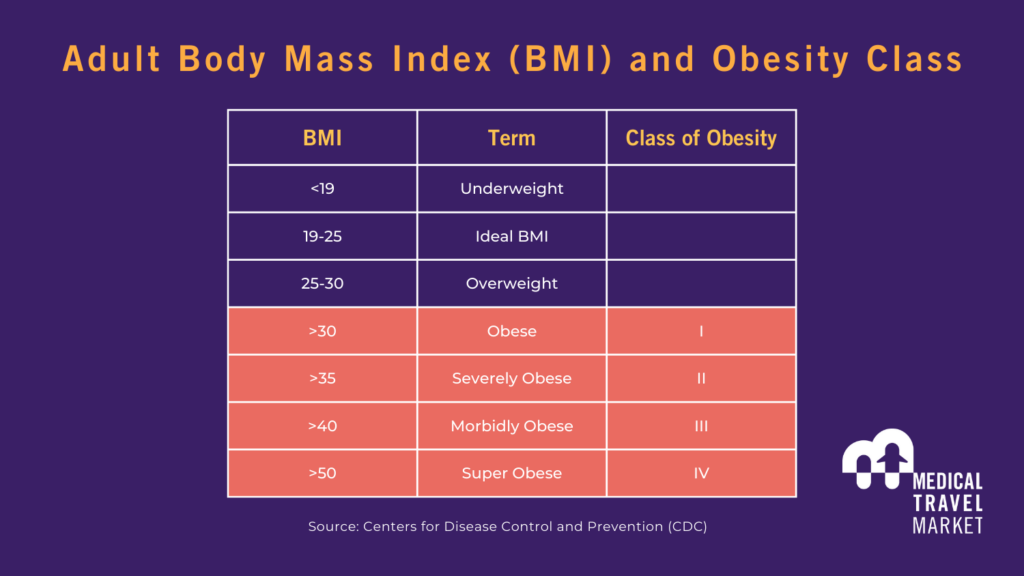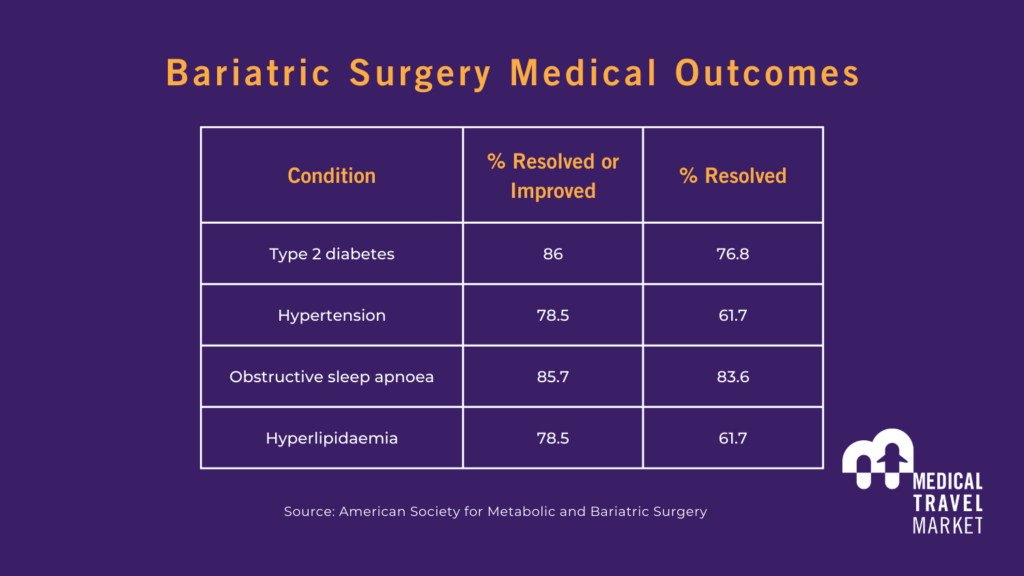These days, the two most common methods of weight loss surgery by far are a gastric bypass or a gastric sleeve, also known as sleeve gastrectomy.
Both can result in major weight loss and significantly improve the outlook for conditions such as type 2 diabetes and high blood pressure.
Body mass index (BMI) is a measure of body fat using height and weight parameters. BMI is a screening tool and does not measure fat directly. Individuals with a BMI of 30 or more are classed as medically obese and at risk of developing obesity-related health issues. Weight loss surgery such as a gastric bypass or a gastric sleeve can prevent or reverse these conditions in some cases.

Gastric bypass
A gastric bypass is considered a serious surgery. It is often the last option for people who have tried and failed to lose weight through healthy eating and exercise. The operation itself has the highest success rate when it comes to any form of weight loss surgery.
The large intestine is ‘bypassed’ by surgically attaching the top part of the stomach to the small intestine. This has the effect of making the individual feel full from small amounts of food. It’s a complex form of surgery, costing between £10,000 to 15,000 in the UK. After the operation, the individual must take long term supplements to ensure their body absorbs enough nutrients.
Gastric sleeve
Gastric sleeve surgery involves stapling a part of the stomach to become smaller overall (in other words, turning the stomach from a pouch into a ‘sleeve’). This means it’s impossible to eat as much as before. However, since the stomach is not bypassed, there isn’t the same problem with the absorption of nutrients.
Patients will still have to take supplements because of the reduced food intake. Gastric sleeve surgery is a more straightforward procedure than a full gastric bypass and costs approximately £8,000 in the UK.
Medical Travel Market got in touch with Burjeel, a comprehensive private tertiary hospital under VPS Healthcare, one of the largest private healthcare groups in the United Arab Emirates. We interviewed one of their leading weight-loss surgeons, Dr Basil Ammori, Consultant Laparoscopic, Bariatric, General, Gastrointestinal & Hepatobiliary Surgery.
Before joining Burjeel, Dr Basil Ammori worked as a Consultant Laparoscopic Bariatric & Hepato-Pancreato-Biliary Surgeon in Manchester, United Kingdom, where he led the Northwest of England’s Bariatric Surgery service.
Here is what he had to say about the different options for weight loss surgery.
Deciding between gastric bypass and gastric sleeve
Question: What is your advice to patients who are unsure about the most suitable weight loss surgery between gastric bypass and sleeve gastrectomy?
While viewing these two surgical approaches, we always consider multiple clinical risk factors in a personalized context for the patient and decide accordingly.
Diabetic patients: If someone has diabetes, especially if diabetic for over 5 years and requires multiple medications, is taking insulin and has poorly-controlled diabetes despite treatment, I prefer gastric bypass for this group of patients. The results seem better in controlling diabetes for this group of patients.
Smokers: Sleeve gastrectomy is the better choice for smokers because if they undergo a bypass, there is a risk of ulceration in the area where we join the stomach to the intestine. This could result in perforation, which is life-threatening or could cause bleeding or lead to narrowing in that area. As a result, I avoid gastric bypass for this group of patients.
Gastro reflux: If someone is suffering from gastro reflux disease, or if they are experiencing heartburn, taking medication such as Nexium, Omeprazole, or Pantoprazole, then gastric bypass is a better option since bypass relieves reflux. Sleeve gastrectomy tends to be associated with reflux disease for 30% of patients.Dr Basil Ammori, Bariatric Consultant Surgeon - Burjeel, VPS Healthcare
Other risk factors such as age, general health and past medical issues are also evaluated during a consultation. Suppose a patient has a medical history of inflammatory bowel diseases such as colon disease or colitis or has undergone previous abdominal procedures. In that case, Dr Basil recommends sleeve gastrectomy as the safer option, given that gastric bypass is a more complex procedure.
Sleeve gastrectomy is a shorter surgery, taking an average operating time of 30 to 40 minutes compared to 1.5 hours for gastric bypass.
To sustain the benefits of weight loss surgery, Dr Basil recommends making lifestyle changes:
I always say that the surgery is the easy part and the hard work is what the patient has to do in the long term to maintain the weight loss; otherwise, there is potential for the weight to come back.
Dr Basil Ammori, Bariatric Consultant Surgeon - Burjeel, VPS Healthcare
Sustaining the results of bariatric surgery
As part of the follow-up care plan, Dr Basil stresses the importance of regular dietician visits to check vitamin and mineral levels and to comply with the prescribed supplements.
He also recommends joining bariatric support groups in the local community or online to help stay focused and achieve your weight management goals.
Benefits of weight loss surgery
In addition to promoting weight loss, which will improve an individual’s overall health and self-esteem, weight loss surgery can reverse chronic conditions such as type 2 diabetes. Weight loss surgery can also help significantly with other serious conditions such as high blood pressure and sleep apnoea.
The table below shows expected medical outcomes from bariatric surgery.

Bariatric surgery can prove life-changing to many individuals who suffer from obesity and obesity-related illness. In addition to the benefits already mentioned, successful surgery and subsequent weight loss can also help joint pain and improve fertility.
If you are considering weight loss surgery, we strongly encourage a consultation with a trained health care provider to determine the best treatment plan for you.
Medical Travel Market is launching agency services this summer to connect patients with the world’s most advanced hospitals and clinics. Sign up below to stay informed.











